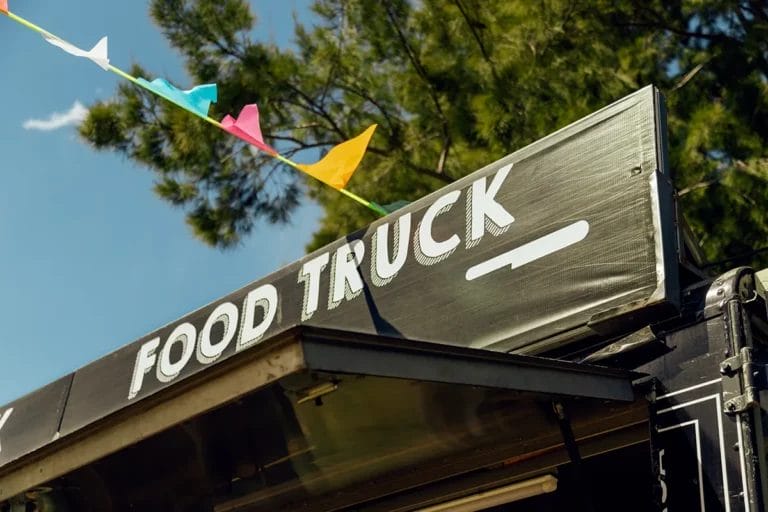Dreaming of taking your culinary dreams on the road and starting a food truck in Connecticut? It can take several months or even a year to establish your business, obtain licenses and permits, and safeguard your business with food truck insurance.
With the average food truck in the Constitution State making $368,139 in revenue per year, this could be the perfect opportunity to turn your passion into profit.
Understand Food Truck Requirements in Connecticut
There are several aspects of your business to establish before applying for licenses or vending opportunities:
- Business name: Give your business a name that’s easy for your customers to remember and accurately describes the food and/or beverages you make.
- Business classification: Sole proprietorship and limited liability company (LLC) are the most popular classifications for food truck businesses, but you may choose to organize your operation differently.
- Employer identification number (EIN): Think of this as your business’ social security number that the IRS uses for tax purposes. Apply online through their website.
- Certificate of Insurance (COI): This document proves you have proper liability coverage to respond to common claims. Festival managers and commercial kitchen owners will also ask to see your COI before renting space to you.
- Business plan: Successful food truck businesses start with a robust business plan. Many agencies require you to submit yours before issuing a license. Banks also ask to see it before issuing a loan.
Obtain Food Truck Licenses in Connecticut
Once you’ve sorted the basics of your food truck business, there are several licensing requirements you must meet before you start vending.
It’s crucial to note that exact requirements differ depending on which cities you operate in, so check with your local government to ensure you have the necessary licenses.
- Registers your food truck business in the state of Connecticut
- Cost: Varies depending on business type ($120 for LLC)
- Where to get it: Connecticut Secretary of the State
- Required by the state of Connecticut for all businesses that prepare and serve food
- Cost: $20 annually
- Where to get it: Department of Consumer Protection
- Mandated by different local governments throughout the state of Connecticut to operate a mobile food business
- Cost: $100–$400
- Where to get it: Your local health department
- Issued by your local health department to certify your food truck is compliant with health and safety codes
- Cost: $150–$250, depending on your city and your business’ risk level
- Where to get it: Your local health department
- Allows you to collect and remit sales tax in Connecticut
- Cost: $100
- Where to get it: Department of Revenue Services
- Ensures you and your employees pass an exam on proper food handling and storage techniques
- Cost: Usually up to $10 per employee
- Where to get it: Connecticut Department of Public Health
- Necessary to obtain if you want to sell alcoholic beverages from your food truck
- Cost: $100 application fee + $440 initial permit fee + $500 vending fee
- Where to get it: Department of Consumer Protection

Learn Connecticut Food Truck Laws
Connecticut has several laws that food truck operators must follow. These regulations ensure all food trucks in the state operate safely and have the proper oversight.
Key laws to be aware of include:
- Commissary kitchen requirements: Some cities, like Middletown, require food trucks to use a licensed commissary (or commercial) kitchen for food preparation and storage. Make sure to check with your city government in case you need to rent a commercial kitchen.
- Vehicle regulations: Conducting business out of a truck means ensuring the truck adheres to Connecticut laws, such as having commercial auto insurance. Depending on the size of your food truck, you may also need a commercial driver’s license.
- State-mandated health inspections: These occur once per year, but you may be subject to more inspections if you operate in multiple locations or at large events like state fairs. Use our health inspection checklist to keep your truck in line with safety standards!
Get Food Truck Insurance in Connecticut
When you’re running your food truck, having the proper insurance coverage in place in case an accident happens is critical. While a commercial auto policy is a critical part of this equation, don’t forget to protect your business with liability insurance, too.
Connecticut food business insurance from Food Liability Insurance Program (FLIP) has the essential coverages you need to shield your finances from the impact of common claims. This includes incidents like:
- A customer contracts a foodborne illness from something you made
- Your truck leaks oil at a venue and the venue manager wants you to pay to clean it
- Someone trips over a cord running out of your truck and injures themselves and they ask you to pay for their medical bills
Cost of Running a Food Truck in Connecticut
Starting your food truck means spending money on licenses, permits, and insurance premiums, but you should also be aware of other standard operating expenses.
- Food truck
- New: ~$100,000
- Used: $44,000–$63,800
- Cooking equipment
- Grill/griddle: $300–$2,500
- Deep fryer: $400–$2,000
- Oven: $500–$5,000 depending on size
- Refrigeration
- Refrigerator/freezer: $1,000–$3,500
- Prep table: $800–$3,000
- Safety and sanitation
- Commercial sink: $200–$1,500
- Handwashing sink: $150–$600
- Fire suppression system: $2,000–$5,000+
- Technology
- Point of Sale (POS) system: $500–$2,000 upfront (plus $50–$100/month for software)
- Inventory management software: $20–$200/month
Pro Tip: Don’t forget to factor in the cost of ingredients into your overall expenses. To ensure you make a profit while covering these costs, make sure you have a solid food pricing strategy in place.

Connecticut Food Truck Festivals
One of the best aspects of running a food truck is the freedom to take your business on the road and participate in food festivals across Connecticut! Be sure to check the requirements in each city you visit, and you’ll soon expand your customer base and make your mark on the local food truck scene.
Excellent food festivals you should check out include:
- SpringFest Mega Food Truck Festival
- Riverfront Food Truck Festival
- CT Food Truck Battles
- Middletown Food Truck Festival
Check out our food festival directory for more vending opportunities!
FAQs About Starting a Food Truck in Connecticut
Are There Specific Zoning Regulations for Food Trucks in Connecticut?
Yes — they vary from one city to the next. In general, expect to face the following restrictions:
- Location: Most cities have rules that prevent food trucks from parking too close to schools or residential areas and require you to operate only in designated areas
- Time limits: Some cities limit how long you can park your food truck at certain locations
What Food Operations Do Not Need a Permit in Connecticut?
None! All food businesses need permits in Connecticut, but the type and number of permits vary depending on the type of business you run.
What Are the Fire Safety Requirements for Food Trucks in Connecticut?
Fire safety requirements for Connecticut food trucks typically include:
- A mandatory fire safety inspection
Installed fire suppression systems - Approval for use of propane, electrical systems, and specific cooking equipment
Each city has its own fire safety requirements, so be sure to check in with your local fire department.

Alex Hastings
Seattle-based copywriter and (WA) licensed insurance agent Alex Hastings leverages her experience as a lover of fast-casual food, baked goods, and iced oat milk lattes. She holds a B.A. in Creative Writing from Western Washington University. Before working at Veracity, she was a retail copywriter at Zulily and an English language teacher in South Korea. Alex is fully trained on FLIP insurance coverages and writes content that connects food and beverage business owners with the policies they need.
Seattle-based copywriter and (WA) licensed insurance agent Alex Hastings leverages her experience as a lover of fast-casual food, baked goods, and iced oat milk lattes. She holds a B.A. in Creative Writing from Western Washington University. Before working at Veracity, she was a retail copywriter at Zulily and an English language teacher in South Korea. Alex is fully trained on FLIP insurance coverages and writes content that connects food and beverage business owners with the policies they need.

Kyle Jude
Kyle Jude is the Program Manager for Food Liability Insurance Program (FLIP). As a dedicated program manager with 10+ years of experience in the insurance industry, Kyle offers insight into different coverages for food and beverage business professionals who are looking to navigate business liability insurance.
Kyle Jude is the Program Manager for Food Liability Insurance Program (FLIP). As a dedicated program manager with 10+ years of experience in the insurance industry, Kyle offers insight into different coverages for food and beverage business professionals who are looking to navigate business liability insurance.


